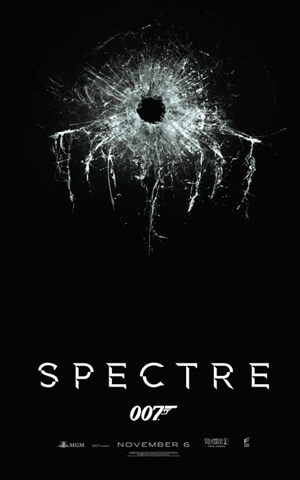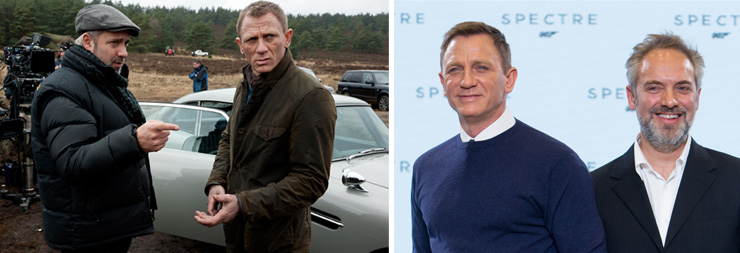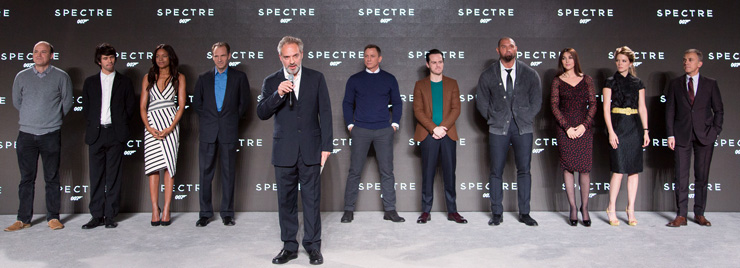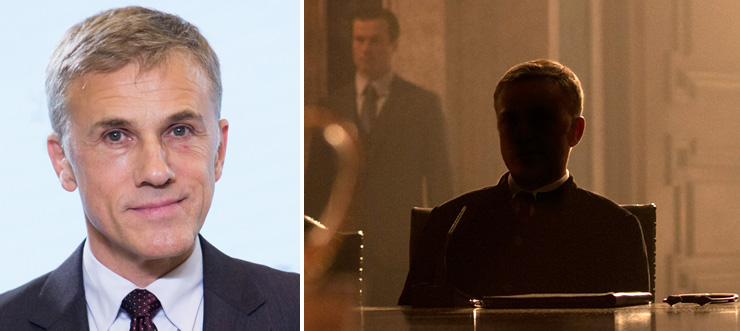EXCLUSIVE ARTICLE |
||
|
||
EXCLUSIVE ARTICLE |
||
|
||
|
|
|
|
Luke G. Williams traces the turbulent production history of Spectre and speculates on the prospects for the 24th film in the EON Productions series. WARNING! The following article contains significant spoilers, including references to controversial leaked material. STOP reading now if you want to preserve the secrets of Spectre until October 26 2015. |
|
 |
Once upon a long ago it was all so simple. There was no Internet, no Facebook, no online message-boards and no Twitter. Aside from a poster campaign, a trailer and perhaps a few preview clips on television programmes (all of which, truth be told, it was pretty easy for the casual fan to miss), there was very little in the way of pre-film publicity or chatter in the lead-up to the release of a new Bond film. Neither was this a situation unique to the 007 series; most films slipped into cinemas with the general public knowing very little in advance about them, even if the hype and word of mouth surrounding them was huge. As a consequence, mystique and magic still surrounded the cinema-going experience... When we pitched up to our local ODEON for a screening of EON’s latest Bond opus, uncertainty and excitement flooded our imaginations. A new Bond film! What would the plot be? What new and incredible stunts would we see? And – would the film be any good? |
|
Post-1969 the answer to such questions was usually ‘nothing special’, ‘increasingly contrived ones’ and ‘no’, but somehow that didn’t matter – for uncertainty and hope make perfect bedfellows, and every time the cinema lights dimmed our collective pulses unmistakeably and collectively quickened with the thrill of unpredictability. Those days are long since gone though; unless you have the willpower of a saint, it’s likely that the majority of serious Bond fans already know more about Spectre than they do about their next-door neighbours. With reference to Bond films specifically, and commercial cinema in a broader sense, 1989 was the year that arguably changed everything. The publicity campaign that year for the 16th Bond film, Licence To Kill, proved that slapping the Bond name and 007 logo on a poster, placing a trailer in cinemas and waiting for the money to roll in was no longer good enough. The vast hype and merchandising juggernaut that surrounded the release of Tim Burton’s Batman, which ground Licence To Kill into the box-office dirt, was a harbinger of things to come. New forms of publicity and PR were beginning to emerge and Bond, so long the trendsetter, was now a dinosaur. By the time of GoldenEye, six years later – a far inferior film with a far inferior Bond – EON had learnt their lesson. Ever since, the Bond series has been marketed to perfection – higher budgets have been matched by eye-watering sums being splurged on publicity, greater attention has been paid to higher-profile recruitment, both in front of and behind the camera, and the power of social media has been harnessed to further drive the hype and expectation surrounding each Bond opus. EON’s new-found mastery of marketing reached its zenith with 2012’s Skyfall; a film that perfectly mixed nostalgia and modernity, both in content, form and media profile, with spectacular results at the box-office – namely a staggering gross of around $1.1billion. Nevertheless, as gratifying as Skyfall’s huge success was, and as artistically satisfying a film as it was, I can’t help but feel that some of the movie-going mystique of days gone by has been lost forever since that landmark year of 1989, a point reinforced by the extraordinary production history of Skyfall’s successor in the Bond series, Spectre, with the twists and turns in its writing and pre-production processes having been played out in embarrassingly public detail. In the wake of the spectacular success of Skyfall, the first confirmed detail about the 24th Bond film came when it was announced in November 2012 that John Logan, the screenwriter who had shared credit on Skyfall with long-time series scribes Neal Purvis & Robert Wade, would be the sole author of ‘BOND 24’. Meanwhile behind the camera, despite overtures from producers Barbara Broccoli and Michael G Wilson for him to return, Skyfall helmer Sam Mendes initially ruled himself out of the running to be the first man since John Glen to direct successive Bond films, declaring in March 2013: ‘‘Directing Skyfall was one of the best experiences of my professional life, but I have theatre and other commitments… that need my complete focus over the next year and beyond.” |
|
 |
|
|
By July though, the 49-year-old (50 in August) former wunderkind of British theatre had undergone a change of heart, and it was announced that he would be returning after all. The planned release date for ‘BOND 24’ of October 2015 apparently gave Mendes the space he needed to balance his other ambitions with the 007 series. “I am very pleased that by giving me the time I need to honour all my theatre commitments, the producers have made it possible for me to direct ‘‘BOND 24’’,” he commented. As well as securing Mendes’ involvement, the extended pre-production period for ‘BOND 24’ would have a dramatic impact on the film’s direction and content, for it allowed DANJAQ and Metro-Goldwyn Mayer, as of November 2013, to finally secure from the estate of the late Kevin McClory the long-disputed rights to Thunderball and all properties associated with it, notably the villainous organisation Spectre and its head, the iconic villain Ernst Stavro Blofeld. |
|
 |
|
|
Ironically, a year earlier, Broccoli had denied that she and Wilson were considering a return for Blofeld and SPECTRE, commenting: “The thing is Blofeld was fantastic for the time but I think it’s about creating characters that are, villains that are more appropriate for the contemporary world. It’s more exciting for us to create somebody new.” However, at a press conference on 4 December 2014 to announce the title and cast of ‘BOND 24’, just four days before filming began at Pinewood Studios, it became clear that these comments were a smokescreen, or that EON had undergone a radical change of heart – with Mendes, Craig and several other members of the film’s cast in attendance it was announced that ‘BOND 24’ would be called Spectre, although no confirmation was forthcoming concerning whether the character of Blofeld would feature. Instead, the brief and intriguing synopsis for the film released to the world’s media merely read: “A cryptic message from Bond’s past sends him on a trail to uncover a sinister organisation. While M battles political forces to keep the secret service alive, Bond peels back the layers of deceit to reveal the terrible truth behind SPECTRE.” |
|
|
The reaction of Bond fans worldwide to the title and synopsis was broadly positive, while the impressive supporting cast – incorporating the return of Skyfall supporting players Ralph Fiennes, Naomie Harris, Ben Whishaw and Rory Kinnear, as well as series debuts for Christoph Waltz, Léa Seydoux, Dave Bautista, Monica Bellucci and Andrew Scott – also won approval. The following day, it was also revealed by Jesper Christensen, in a key spoiler that doubtless infuriated EON that the character of Mr. White would also feature in the new film – making it clear that Spectre would try to establish some form of link between its storyline and the Quantum organisation which featured in Casino Royale and Quantum of Solace. |
![Jesper Christensen as Mr White in Quantum of Solace [deleted scene]](secrets/mr_white.jpg) |
|
The presence of Waltz, in particular, caused widespread rumour and innuendo, with most observers pegging the double Oscar-winning actor as a likely Blofeld, despite the announcement of his character’s name as Franz Oberhauser, apparently the son of the original Ian Fleming character Hannes Oberhauser from the short story OCTOPUSSY, in which he was revealed to be the man who taught a young Bond to ski and mountain climb. In Fleming’s story Bond commented of Oberhauser that he was “a wonderful man” and “something of a father to me at a time when I happened to need one.” This brief reference seems to have expanded into Spectre’s main back-story, with a ‘temporary guardianship’ certificate in the film’s teaser trailer, handed to Bond by Moneypenny as part of 007’s “personal effects” recovered from the destruction of Skyfall, suggesting that after the death of Bond’s parents he was placed by his aunt Charmian Bond into the care of Oberhauser, making Waltz’s Franz Oberhauser his adopted brother. |
|
 |
|
|
Unfortunately, the excitement concerning the beginning of Spectre’s seven-month production period – with filming scheduled for England, Austria, Italy, Morocco and Mexico – and the gossip surrounding Waltz’s ‘is he or isn’t he’ status as Blofeld, would soon be overshadowed by a crisis at Sony Pictures, the distributor of the film. After a cyber-attack on Sony’s IT and email system, possibly sanctioned by the North Korean government in an act of vengeance against the portrayal of the company in the comedy film The Interview, hitherto private material from emails concerning the chaotic pre-production of Spectre throughout 2014 began leaking uncontrollably and embarrassingly into the public domain. For those Bond fans curious enough to look, the leaks ranged the full gamut from the absurd to the comic to the fascinating. One revelation was that the character of Blofeld had been in the script treatments for ‘BOND 24’ from the start, even before the announcement of the rights resolutions with the McClory estate. It also seemed that Logan’s initial concept for a shock twist in the film was for Bond’s arch-nemesis to be revealed as a woman, an idea which was not well received by Sony executives, although they pondered whether the casting of Meryl Streep might cause them to escape the inevitable ire of Bond traditionalists at such a radical departure from the original conception of the character. |
|
|
|
|